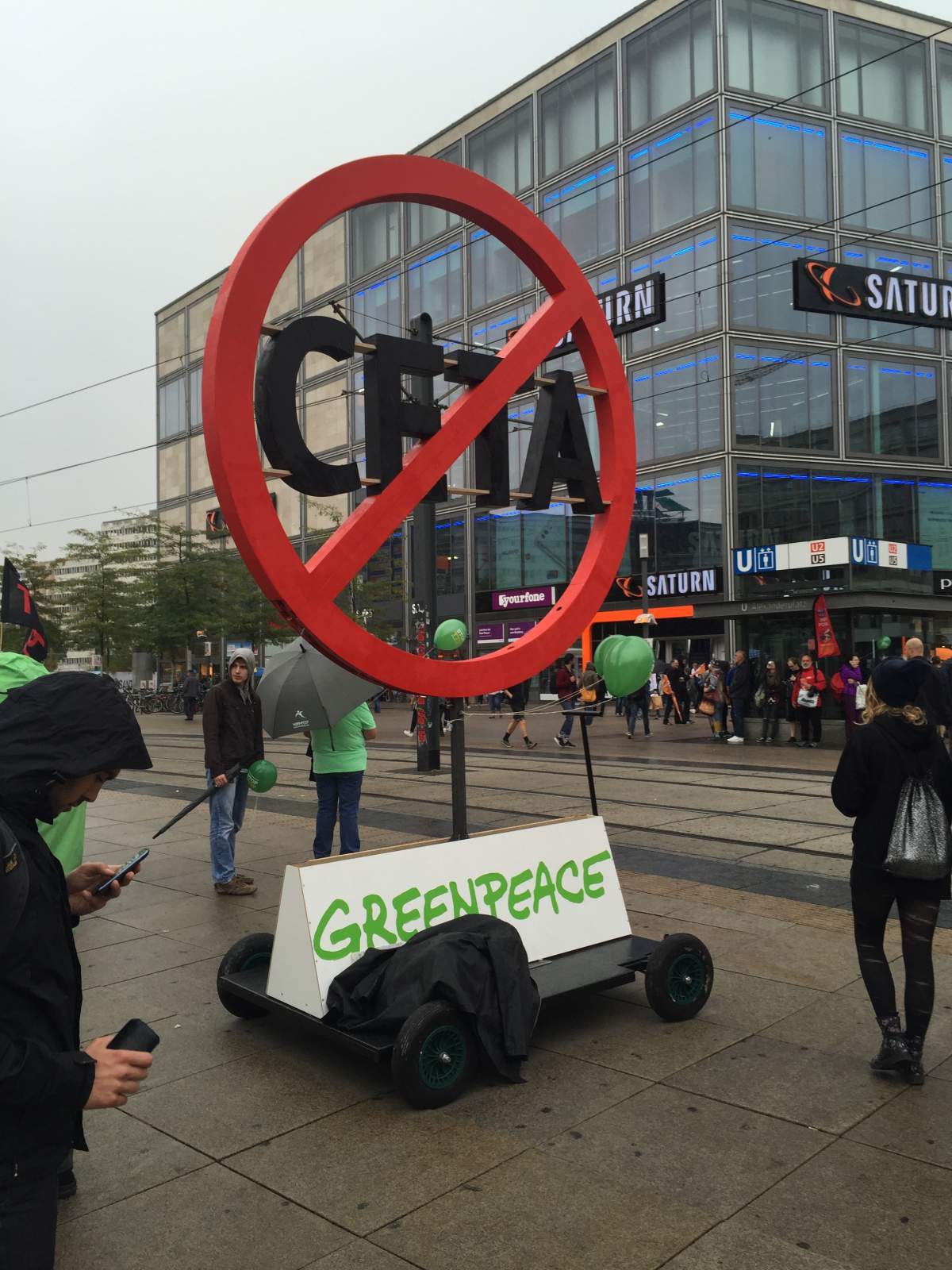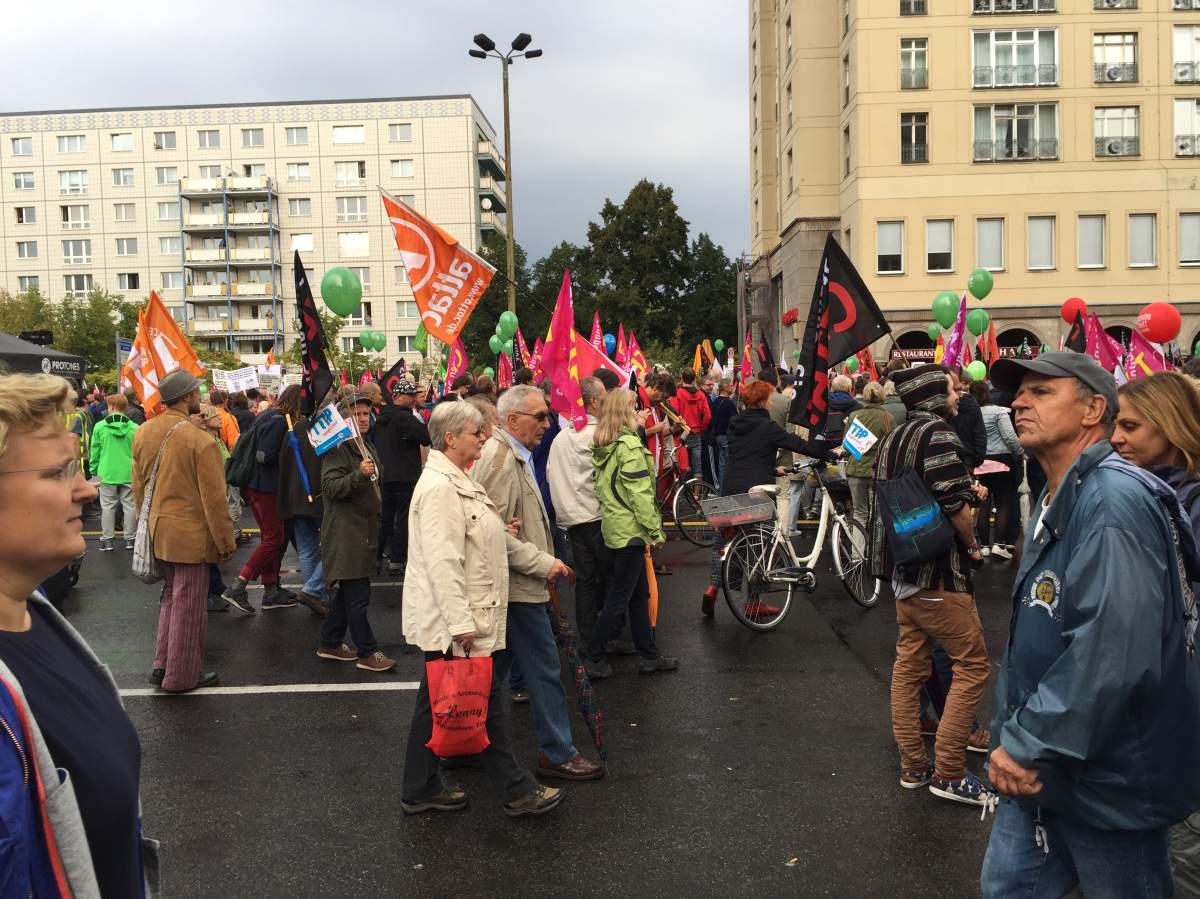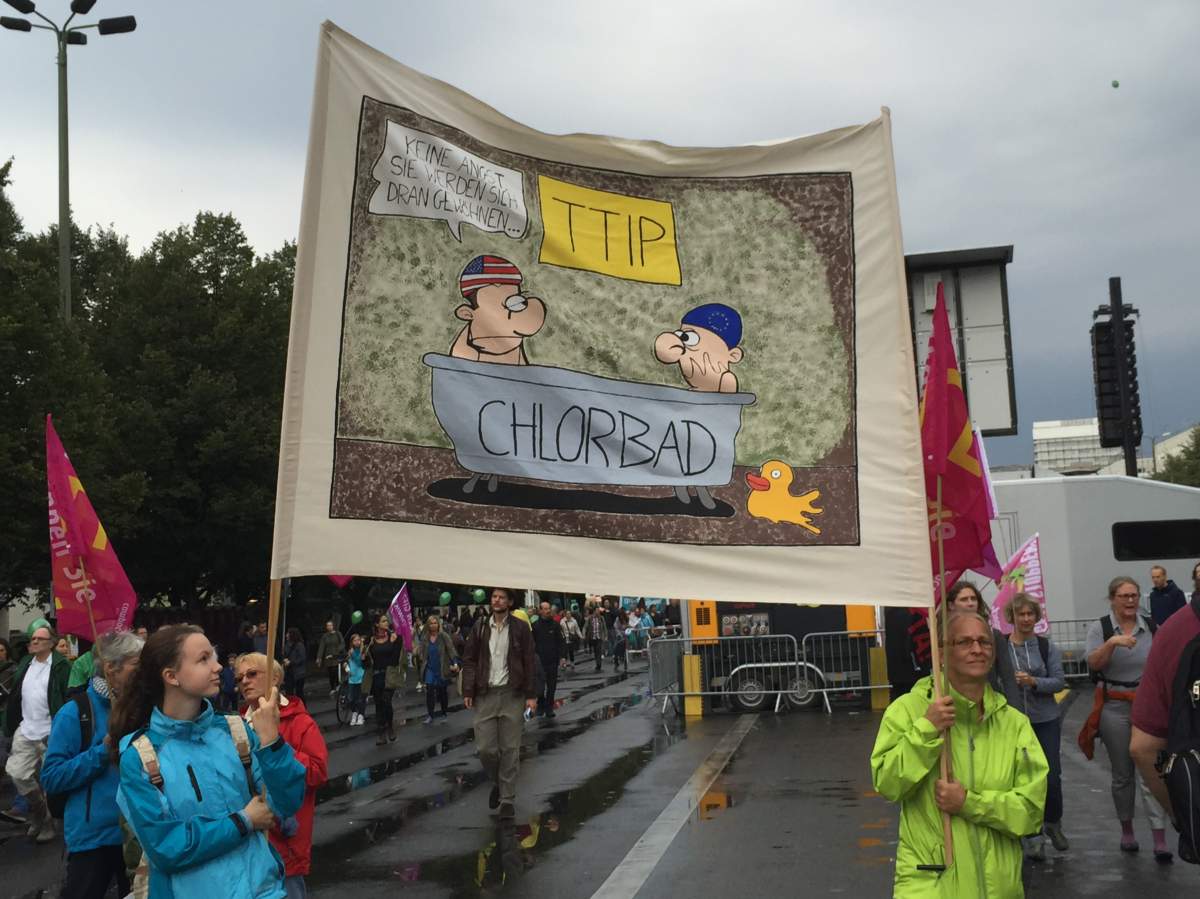BERLIN — Demonstrators took to the streets of Berlin and six other German cities Saturday to voice their displeasure with pending trade deals, one between the European Union and Canada and another with the U.S.

Their message from the streets: “Das ist schlecht fur Deutschland (This is bad for Germany).”
The treaties they’re concerned with are the yet-to-be ratified EU pact with Canada, known as the Comprehensive Economic and Trade Agreement (CETA), and the EU’s Transatlantic Trade and Investment Partnership (TTIP) deal with the U.S. that is still being negotiated.
Gathering in Berlin’s Alexanderplatz, a famous public square in the heart of the German capital, protesters waved flags and homemade placards bearing messages like “Stop TTIP and CETA!”
Tens of thousands more reportedly turned out in Frankfurt, Hamburg, Cologne, Leipzig, Munich and Stuttgart.
READ MORE: Canada-EU trade deal has Germany’s approval, minister says
As the demonstrators marched from Alexanderplatz down Karl Marx Allee, a wide boulevard that stands as a remnant of the former East Germany, several women gathered together unfurling their flags and banners. One woman, who identified herself as Briginia, told Global News she shared the sentiment that CETA and TTIP are not good deals for Germany.
“There are some conditions that people didn’t know about,” said Briginia, who brought her teenage daughter to the rally. “For example, if medicine or food are allowed in Germany they have to be approved before and this is not the same [process] in the USA.”
“This is also the same for Canada,” she said when asked about her thoughts on CETA.
While the deal between the EU and Canada has escaped the same scale of criticism and widespread outrage among the Canadian public, it continues to be a hot button political issue in Germany and one that protesters are hoping to stop from being ratified sometime in the fall.
Despite the protests and opposition, Germany’s economy minister continues to advocate strongly for the agreement, in public, and was in Montreal Thursday to me with Prime Minister Justin Trudeau International Trade Minister Chrystia Freeland to disuss the deal.

Get daily National news
Trudeau has publicly stated his support for the deal, saying at a news conference in June, “It’s a good deal for Europe, it’s a good deal for Canada.”

The agreement, which was signed in principle in 2014, would eliminate 98 per cent of tariffs allowing for the free flow of goods and services between the EU and Canada.
Supporters of the deal say it will bring some $12 billion into the EU economy per year, but critics have serious concerns.
In broad terms the critics say that CETA would give multinational corporations too much power within European Union markets and they object to a dispute resolution mechanism that has been proposed in the framework agreement.

This dispute resolution mechanism would allow companies to bypass national courts in both countries, allowing then to argue their cases in front of international arbitration panels instead.
In official literature handed out by Greenpeace Berlin, one of the NGO’s involved in organizing the protest, the environmental group states:
“CETA, the free trade deal between Canada and the EU has already been thoroughly negotiated and written up. Just like TTIP, it presents a great threat to environmental and consumer standards and undermines our democratic structures.”
The thousands of protesters that turned out in the seven German cities are evidence of just how bitter the opposition towards CETA and TTIP is in Germany.
In fact, these two free trade agreements have seen some of the most vocal opposition and protests of any trade deals in German history.
READ MORE: Obama heads to Germany to promote protested trade deal
In recent weeks, TTIP has essentially been declared dead in the water. “In my opinion, the talks with the United States have de facto failed, even though nobody really admits that,” German Economy Minster Sigmar Gabriel said in late August.
But those that came out to demonstrate are concerned that it may not be quite as dead as the politicians proclaim and that the EU will start negotiations on another trade deal to replace it.
Some of the Berlin protesters expressed concern over the fact that much of the negotiations for both CETA and TTIP were done behind closed doors and that the full text of the framework agreements is not readily available, essentially making the process undemocratic.
“I don’t want to sign a treaty that I can’t read,” said Martin, a Berlin resident who came out to support the demonstrations. “I want a world democracy and this is not what’s happening.”
Opposition to the agreements is so strong that a coalition of German non-government organizations have filed a case against CETA in Germany’s top court.
According to dpa, Germany’s main news wire service, this is the largest ever case of it’s kind to be heard by the German High Court in Karlsruhe. The court received 125,000 signatures on petitions that had to be transported to the court in 70 cardboard boxes.
The demonstrators that came out Saturday hope the protests and court case can pressure the German government to stop the ratification of CETA and hopefully keep the TTIP negotiations off the rails for good. But given these are EU trade deals that seems an unlikely prospect.
Melanie de Klerk is an assignment editor at Global National. She is currently living in Berlin as one of the 2016 Arthur F. Burns Journalism Fellows.










Comments